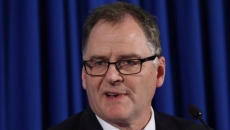Canadians should expect to see a lot more of Conservative Leader Pierre Poilievre in the coming months as the party uses its full war chest to reach out beyond its base.
That's essentially what Robert Staley, the Toronto lawyer named by Poilievre to lead the Conservative Fund, told delegates Friday at the party convention in Quebec City.
"We will continue to spend on tour and we will continue to spend on advertising," Staley said.
"All of this is being done to influence voters, especially in key ridings to support the party and our leader in the next election."
More than 2,000 Conservatives are in Quebec City for the party's convention, and will hear directly from Poilievre himself when he takes the stage Friday night.
The mood at the convention is buoyant, following a number of polls that show the party with a considerable lead over the governing Liberals. While no election is imminent, the numbers are lifting the spirits of party members clamouring for a return to power after being shut out for nearly eight years.
The convention comes almost exactly one year since Poilievre scored a resounding first-ballot victory in the leadership race and it is the first time he will address a policy convention as the party's head.
Since he became leader last September, the party's fundraising numbers have soared, allowing it to generate surpluses which are being aimed at helping Canadians warm to the idea of Poilievre as their next prime minister.
More than $3 million has gone toward an advertising campaign launched in early August that features his wife, Anaida, introducing him as a father and a husband, as well as Poilievre himself appearing with his son, talking about his desire to fix the country's woes.
Poilievre spent the summer touring the country, talking up his party as the option for Canadians who want hope and relief from soaring housing prices and a high cost of living. Those are issues that Prime Minister Justin Trudeau's Liberals have so far struggled to convince the country they can fix.
"Our tour is not directed at bringing out the faithful," Staley said. "With our leader's tour we are trying to reach new voters with Pierre's common sense messages and it costs more to do it well, and we are doing it well."
He added: "That means doing more to advertise events and try to reach people who otherwise wouldn't have supported the party."
For Conservatives, that includes young people, blue-collar workers and newcomers, particularly in and around the country's biggest cities.
Before Poilievre, the delegates will hear from former cabinet minister Peter MacKay.
MacKay skipped the virtual policy convention in 2021 following his defeat in the 2020 leadership race and his appearance here is viewed by some as a kind of homecoming.
The party for this convention is billing him as one of its co-founders, referencing his role in the merger of the former Progressive Conservative party, which he led, with the Canadian Alliance.
One of the goals of the convention is to get party members fired up for the next election, which doesn't have to happen for another two years but could come earlier because of the minority Parliament.
On Thursday, the Conservatives unveiled a new logo as well as a selection of merchandise with Poilievre's often-used catchphrase of "Bring it Home."
Delegates are also set to discuss what changes they want to make to the Conservative policy handbook and constitution. Suggestions range from declarations around crime and public safety to prohibiting surgical and pharmaceutical gender-affirming care for minors and protecting the rights of those who refuse vaccination.
Some ridings in British Columbia and in Toronto are also pushing the party to set more environmental priorities in official party policy.
Poilievre has made efforts over the summer to broaden his appeal by softening his image, ditching the glasses and suit jacket.
And while his MPs and supporters are buoyed by the recent polls, Poilievre also has the task of managing expectations that rougher waters may still be ahead, as well as keep the focus on what he considers to be winnable issues, such as housing and the cost of living.






